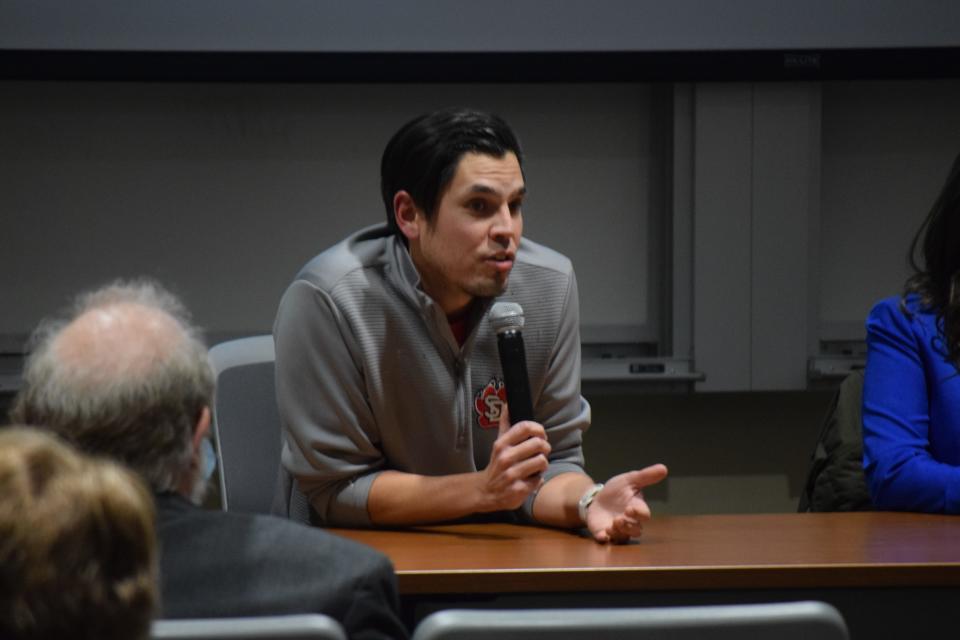USD employees told to remove tribal affiliations, pronouns from email signatures
South Dakota’s six public universities controlled by the Board of Regents are starting to enforce a new communications and branding policy the Regents passed in December.
Enforcement of this policy has led two administrators, who work with the Native American population at the University of South Dakota, to speak out about how they were asked to remove their pronouns and tribal affiliations from their email signatures.
While neither of them responded to emails or phone calls from the Argus Leader immediately Wednesday, their personal social media posts about the issue made the rounds on social media and in emails to the Argus Leader on Tuesday night.

John Little, director of Native recruitment and alumni engagement at USD, said on Instagram that he received an email March 13 with a written warning for including his tribal affiliation, “Standing Rock Dakota,” and his pronouns, in his email signature. He said the email stated if he didn’t remove his tribal affiliation and pronouns from his email signature, he’d face suspension from USD, “and then there would be a decision made about termination,” according to his social media post.
Megan Red Shirt-Shaw, director of Native Student Services, said on Instagram that she received an email March 16 stating she was in violation of the Regents' policy for including her tribal affiliation, which she said is “Oglala na Sicangu Lakota.” If she didn’t comply, she would be issued a formal written warning from Human Resources, her post states.
Policy 1.7.6 states that contact information, such as a signature block, is limited to:
name;
educational credentials or degrees earned;
job title and name of unit;
email addresses;
physical and mailing addresses;
phone number;
web links to official institutional websites or social media platforms;
the university logo and motto;
and any professional disclosures.
“Pronouns” and “tribal affiliation” are not explicitly stated in the policy, but it states that other information, graphics or links are prohibited. An employee who fails to adhere to the policy could be disciplined, the policy states.
BOR director of communications Shuree Mortenson said the policy doesn't infringe on the individual free speech rights of employees, and the policy "ensures a consistent approach to official employee communications across our institutions."
Asked how many other USD or system employees faced the possibility of discipline, suspension or termination for noncompliance with this new policy, Mortenson said the BOR doesn't comment on personnel matters.
The policy "emphasizes the importance of communicating the information necessary for our employees to effectively perform job duties," Mortenson added.
"Although some employees may have additional information they would like to share, as an employer, it is critical to identify consistent parameters for official employee communication," she said. "While supplemental contextual information can offer value in certain instances, consistent criteria for communications are necessary to safeguard our universities' missions and interests."
‘Deeply disappointed’
Both Little and Red Shirt-Shaw stated in their social media posts that after consulting with legal services, they decided to remove their tribal affiliations and pronouns from their email signatures.
However, they have also placed that information in the body of emails they send, instead of in the signature at the bottom of an email. They were told that they wouldn't be challenged for now by USD administrators or the BOR for putting that information in the body of their email signatures.
Both wrote that they were “saddened” and alleged the Regents continue the erasure of Native people in the state of South Dakota with this policy enforcement.
Little stated he was also told in the written warning meeting with human resources, that if he was suspended, he wouldn’t be allowed to attend the 12th Annual Native Alumni Dinner or 50th Annual Wacipi, both public events at a public university. He added he was “deeply disappointed” in USD.
More: Mason Archambault's stardom shines bright at USD's Native American Heritage Day event
“This is an institution that I have sacrificed time and energy to support, while simultaneously they did not hesitate to provide me with a permanent written letter to my record and with the threat of termination for using my tribal affiliation and pronouns in my signature,” Little stated.
Red Shirt-Shaw said with her title as director of Native Student Services, she feels she has an ethical responsibility to claim the tribal nations that make her who she is.
“From an academic standpoint, I have always loved the field of higher education for its possibilities,” she said. “Now in pursuing a Ph.D. in the field, believing it can change if we advocate, we must continue to seek justice for the students we love the most. I hope that the BOR will consider how their policies impact staff members and amend policy 1.7.6.”

‘Unnecessarily restricting’ free speech
USD’s Student Government Association (SGA) passed a resolution in February opposing policy 1.7.6, calling for changes to it, and expressing dissatisfaction with the process by which the Regents developed and passed it.
The resolution criticizes the policy because it didn’t go through traditional mechanisms established to allow for stakeholder evaluation and input. Policy 1.7.6 passed on a first and final reading at the Regents’ December meeting.
The SGA also criticized the policy for applying to students who are on work-study or employed by the university, requiring separate email accounts for student employees who use email for their job.
“This policy results in the prohibition of using personal pronouns in professional communication, unnecessarily restricting the speech of university employees,” SGA’s resolution states.
Email signatures should allow for the inclusion of information such as professor office hours, land acknowledgement statements, pronouns, working hours and more, according to SGA’s resolution. Pronouns have value for those whose names are unisex, and sharing pronouns is commonly practiced outside of academia and in professional spaces, SGA’s resolution explains.
At the Feb. 20 SGA meeting, USD student Carter Linke questioned Student Regent Brock Brown about the policy and said it was part of a greater scheme to try to erase queer people from the public university system. Brown responded by saying Linke’s input was “so ridiculous, I will not acknowledge it.”
Brown, a USD law school student, said during the student feedback portion of the meeting that he had a problem with the facts in the resolution and noted SGA, Student Federation and USD students didn’t speak during public comment time about the policy debate at the December Regents meeting.
He added when acting in an official capacity as an employee of a state-funded institution like the BOR or USD, “you lose certain rights, which means that your right to free speech is not absolute.”
USD student and SGA Senator Sam Markley said both Little and Red Shirt-Shaw do “incredible work” for USD and that he’s ashamed to see the administration immediately threaten them with suspension and termination simply because of their speech.
“I would argue that preventing the director of Native recruitment from advertising that they are a member of a tribe, something that seems pretty relevant to their job, not only prevents USD from being a successful brand but also is incredibly ignorant and re-entrenches centuries of erasure that the Native community has experienced in the state and in this country,” Markley said.
This article originally appeared on Sioux Falls Argus Leader: USD employees told to remove tribes, pronouns from email signatures

